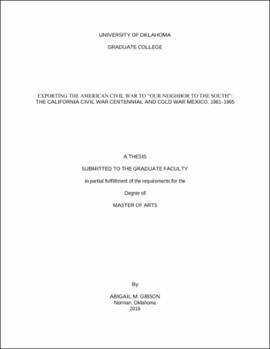| dc.description.abstract | This project is about the California Civil War Centennial Commission’s (CWCC) articulation of California’s contemporary state identity through the lens of Civil War commemoration in the early 1960s. In its task to commemorate California’s participation in the American Civil War as a part of the National Civil War Centennial between 1961 and 1965, the California CWCC chose to focus almost exclusively upon the Golden State’s role in staving off the French intervention in Mexico between 1862 and 1867, an episode in European, Mexican, and American history that is only now receiving significant scholarly attention. The California CWCC–at the legislative mandate of the California State Assembly–focused their attention on three historical events and figures that related to the French intervention: the restoration of constitutional government in Mexico upon the overthrow of Archduke Maximilian and Napoleon III’s forces, the political career of U.S. Senator James A. McDougall, and the wartime efforts of the Pacific Naval Squadron along the Pacific Coast. Together, these three components form what I term the CWCC’s “California thesis,” which argued that California’s great contribution to the nation–and the world–during the Civil War was in warding off the incursions of empire and unfreedom in Mexico and the western hemisphere at large. I argue that the California CWCC, at the behest of the California State Assembly, chose the French intervention into Mexico because the episode had, in their mind, highly relevant present implications. The commission even promoted this particular memory of California’s Civil War participation globally, using it as a means to explore diplomatic channels with Mexico. The California CWCC read their Cold War moment backwards onto the French intervention by presenting it as an instance when the United States (and particularly California) secured freedom abroad, much like it could in their own time. The California CWCC capitalized on their state’s supposed special connection to Mexico as one of its immediate northern neighbors to assert their state’s primacy in this fight for global freedom both to Americans and, more importantly, to people in Mexico itself. Thus, the project of the Civil War Centennial in California was used in the service of in diplomatic interest. | en_US |
